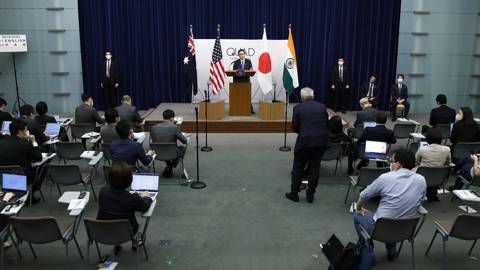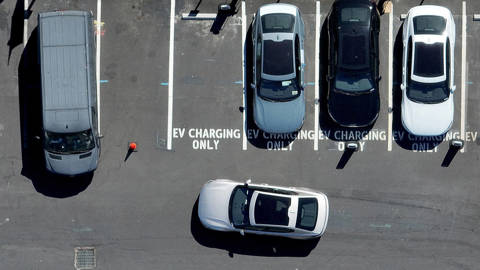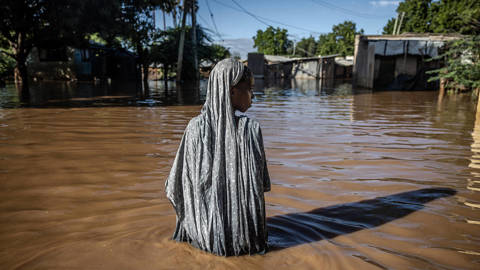Hamas’s crushing defeat of Fatah in this week’s elections brings the Palestinian people to a crossroads. An Islamist political party that previously abstained from national politics and rejects Fatah’s policy of negotiations with Israel, is now in charge in Palestine.
Hamas won 76 of 132 seats in the Palestinian Legislative Council, and can count on support from four independent deputies. Overall, that’s 60% of the seats in Parliament, won in nearly every district in the West Bank and Gaza. Hamas entered electoral politics only recently, but its massive victory was preceded by wide success in municipal elections. Hamas’s political moment has come.
Under Palestinian law, Mahmoud Abbas, the Palestinian president, must now ask Hamas to form a new government. For their part, Fatah officials seem unwilling to join a Hamas-led government. Although Hamas has said that it would seek such a coalition, Fatah’s humiliating defeat has left it with little credibility as a governing partner.
So far, Fatah’s senior leaders have declared that they will be a loyal opposition in Parliament, leaving governmental responsibility to Hamas. Instead, they will have to focus on rebuilding and reenergizing Fatah.
Hamas is well aware of the shock that its victory has produced. If Fatah refuses to join a coalition, Hamas may opt for a government of independents and technocrats. It is unlikely that Hamas will form a government composed of hardliners. The political, security, and economic circumstances of the Palestinians require a government focused on solving problems, not ideological purity.
The most urgent challenge facing the new government is rampant lawlessness and anarchy throughout Palestinian society. Murder, kidnapping, and extortion have reached record heights. Armed individuals resort to kidnapping to get jobs, free family members from prison, and exact revenge.
Often, the people involved in these crimes belong to local gangs or even to the militias of large clans. In opposition, Hamas adamantly refused to collect illegal weapons. Now, it will have to deal with a Palestinian society that is armed to the teeth, with poverty rates reaching 70% and unemployment at 35% .
Having benefited from overwhelming political rejection of Fatah, Hamas will now be judged by how it uses its new authority. For the first time, a political clock is ticking for Hamas. Senior Hamas officials are well aware of the challenge, and have promised a complete overhaul of Palestinian public services and administration. More than anything else, Hamas’s success in the coming months will be measured by its response to these issues.
Will Hamas be able to root out corruption and incompetence, and deliver services fairly and efficiently? How will its election affect Palestine’s foreign aid inflows, which form major component of the national budget?
Initial international reaction to the Hamas victory has been severe. The Bush administration has declared that it will not deal with a Hamas government, because Hamas remains committed to Israel’s destruction. This, indeed, is the language of Hamas’s 1988 covenant.
Interestingly, however, Hamas’s election platform combined different approaches to the issue of a Palestinian state. On the one hand, Hamas agreed for the first time to the establishment of a Palestinian state in the West Bank and Gaza, with East Jerusalem as its capital. On the other hand, the platform repeats Hamas’s refusal to relinquish even an inch of historic Palestine.
Whether Hamas can actually be transformed into a more moderate organization is impossible to say right now. But it is clear that Hamas is now vulnerable to public opinion and, as a governing authority, will have to deal with the international response to its victory.
Immediately after the election, a senior Hamas official, Mahmoud al-Zahar, said that Hamas would maintain the cease-fire with Israel begun last February, if Israel did the same. Hamas may be signaling that it will not provoke Israel. Perhaps its governing responsibilities will push Hamas toward ongoing discussions with the United States and the international community.
In any case, despite the election results, and even without Fatah in government, Abbas remains in charge of negotiations with Israel. He has quickly called for a revival of peace talks, although Israel, like the US, has refused to deal with Hamas.
Palestinians have entered uncharted waters. They turned out in droves to vote in an election that former US President Jimmy Carter described as honest, fair and unmarked by violence. They elected a party which called for “reform and change” in response to a decade of violence and lawlessness. And Palestinians accepted Hamas’s view that negotiations based on the Oslo Accords could not achieve Palestinian rights and political ambitions.
Victory achieved, Hamas will take on the responsibility for the Palestinian side in the Israeli-Palestinian conflict. With the Palestinians’ future at stake – not to mention the future of Israel and the Middle East – no one can say if Hamas is up to the task.










Hamas’s crushing defeat of Fatah in this week’s elections brings the Palestinian people to a crossroads. An Islamist political party that previously abstained from national politics and rejects Fatah’s policy of negotiations with Israel, is now in charge in Palestine.
Hamas won 76 of 132 seats in the Palestinian Legislative Council, and can count on support from four independent deputies. Overall, that’s 60% of the seats in Parliament, won in nearly every district in the West Bank and Gaza. Hamas entered electoral politics only recently, but its massive victory was preceded by wide success in municipal elections. Hamas’s political moment has come.
Under Palestinian law, Mahmoud Abbas, the Palestinian president, must now ask Hamas to form a new government. For their part, Fatah officials seem unwilling to join a Hamas-led government. Although Hamas has said that it would seek such a coalition, Fatah’s humiliating defeat has left it with little credibility as a governing partner.
So far, Fatah’s senior leaders have declared that they will be a loyal opposition in Parliament, leaving governmental responsibility to Hamas. Instead, they will have to focus on rebuilding and reenergizing Fatah.
Hamas is well aware of the shock that its victory has produced. If Fatah refuses to join a coalition, Hamas may opt for a government of independents and technocrats. It is unlikely that Hamas will form a government composed of hardliners. The political, security, and economic circumstances of the Palestinians require a government focused on solving problems, not ideological purity.
The most urgent challenge facing the new government is rampant lawlessness and anarchy throughout Palestinian society. Murder, kidnapping, and extortion have reached record heights. Armed individuals resort to kidnapping to get jobs, free family members from prison, and exact revenge.
SPRING SALE: Save 40% on all new Digital or Digital Plus subscriptions
Subscribe now to gain greater access to Project Syndicate – including every commentary and our entire On Point suite of subscriber-exclusive content – starting at just $49.99.
Subscribe Now
Often, the people involved in these crimes belong to local gangs or even to the militias of large clans. In opposition, Hamas adamantly refused to collect illegal weapons. Now, it will have to deal with a Palestinian society that is armed to the teeth, with poverty rates reaching 70% and unemployment at 35% .
Having benefited from overwhelming political rejection of Fatah, Hamas will now be judged by how it uses its new authority. For the first time, a political clock is ticking for Hamas. Senior Hamas officials are well aware of the challenge, and have promised a complete overhaul of Palestinian public services and administration. More than anything else, Hamas’s success in the coming months will be measured by its response to these issues.
Will Hamas be able to root out corruption and incompetence, and deliver services fairly and efficiently? How will its election affect Palestine’s foreign aid inflows, which form major component of the national budget?
Initial international reaction to the Hamas victory has been severe. The Bush administration has declared that it will not deal with a Hamas government, because Hamas remains committed to Israel’s destruction. This, indeed, is the language of Hamas’s 1988 covenant.
Interestingly, however, Hamas’s election platform combined different approaches to the issue of a Palestinian state. On the one hand, Hamas agreed for the first time to the establishment of a Palestinian state in the West Bank and Gaza, with East Jerusalem as its capital. On the other hand, the platform repeats Hamas’s refusal to relinquish even an inch of historic Palestine.
Whether Hamas can actually be transformed into a more moderate organization is impossible to say right now. But it is clear that Hamas is now vulnerable to public opinion and, as a governing authority, will have to deal with the international response to its victory.
Immediately after the election, a senior Hamas official, Mahmoud al-Zahar, said that Hamas would maintain the cease-fire with Israel begun last February, if Israel did the same. Hamas may be signaling that it will not provoke Israel. Perhaps its governing responsibilities will push Hamas toward ongoing discussions with the United States and the international community.
In any case, despite the election results, and even without Fatah in government, Abbas remains in charge of negotiations with Israel. He has quickly called for a revival of peace talks, although Israel, like the US, has refused to deal with Hamas.
Palestinians have entered uncharted waters. They turned out in droves to vote in an election that former US President Jimmy Carter described as honest, fair and unmarked by violence. They elected a party which called for “reform and change” in response to a decade of violence and lawlessness. And Palestinians accepted Hamas’s view that negotiations based on the Oslo Accords could not achieve Palestinian rights and political ambitions.
Victory achieved, Hamas will take on the responsibility for the Palestinian side in the Israeli-Palestinian conflict. With the Palestinians’ future at stake – not to mention the future of Israel and the Middle East – no one can say if Hamas is up to the task.